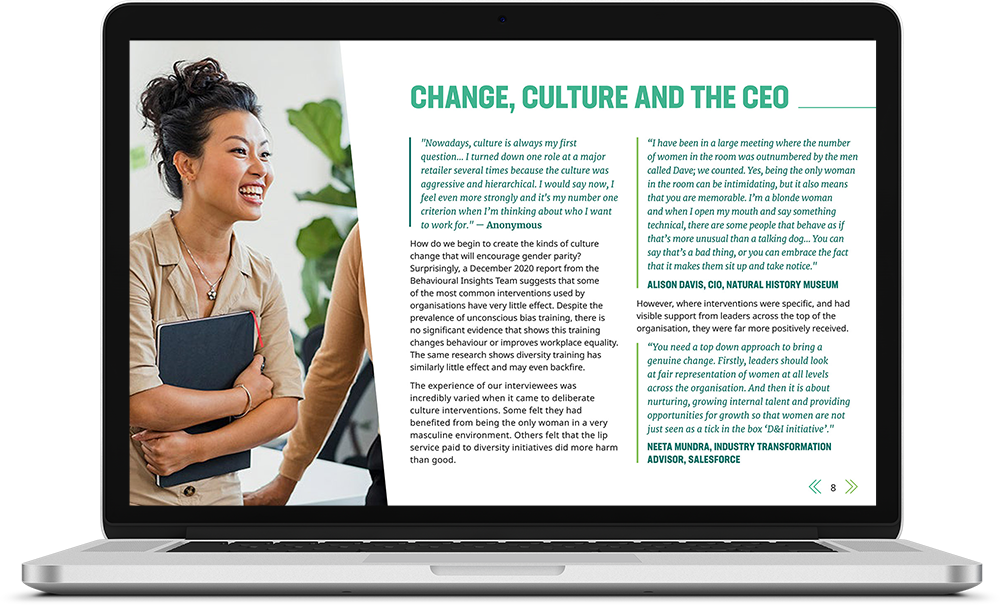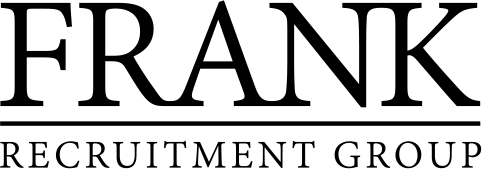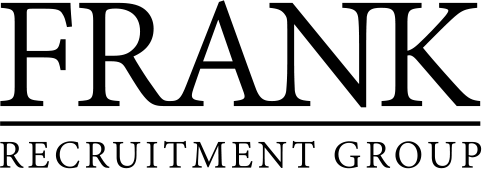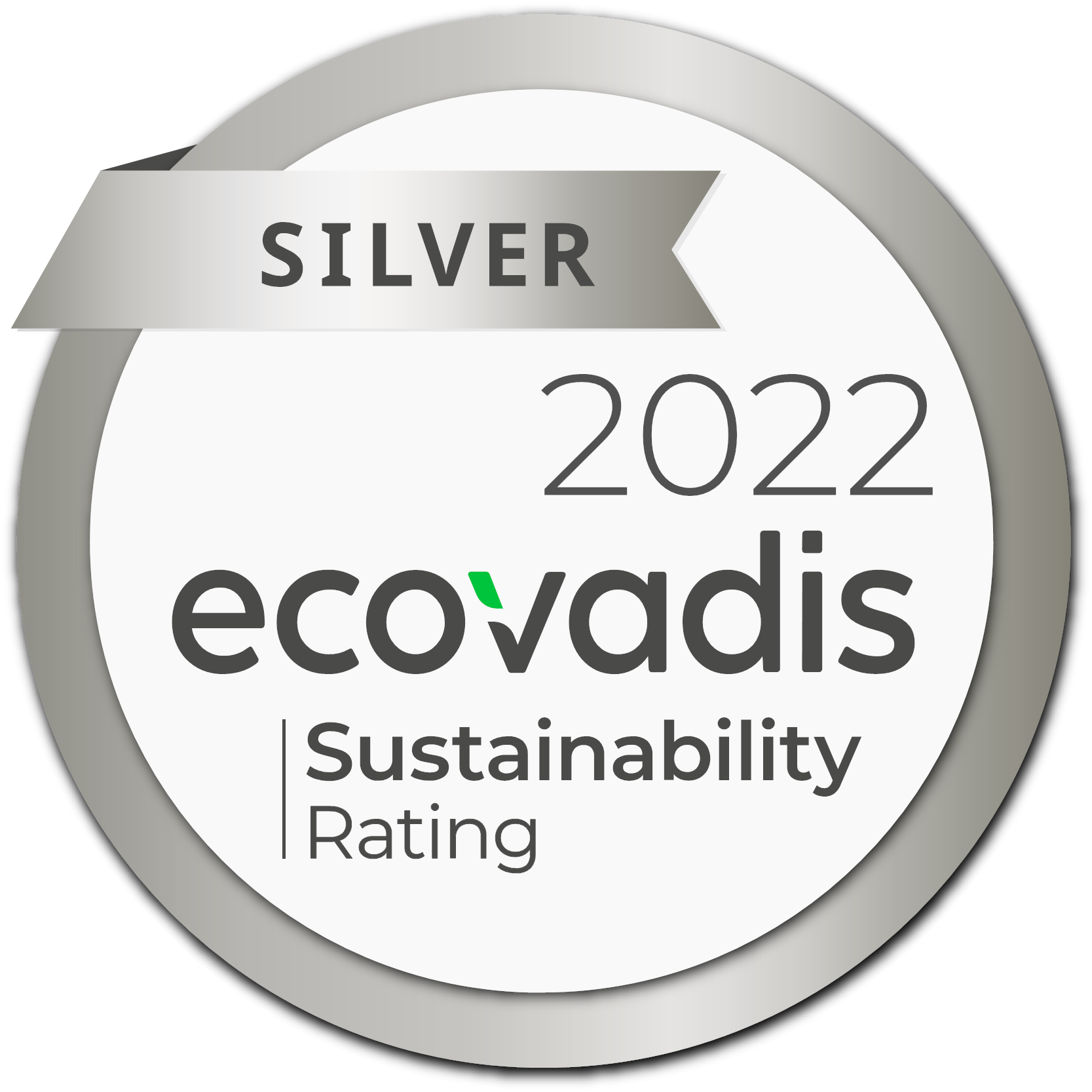Tech’s Leading Women
A video podcast series on lessons in gender, culture, and building an inclusive workplace.

Episode one
The new hybrid workplace and what it means for women
In the wake of the global pandemic, hybrid working is fast becoming the new normal for many of us, in what has undoubtedly been the biggest shake-up to the world of work in generations. But what opportunities can a hybrid workplace offer? And does this new-found flexibility level things up for women?
Zoë: So welcome to “Tech’s Leading Women”, a video podcast series on lessons in gender, culture and building an inclusive workplace.
My name’s Zoë Morris, and I’ll be moderating our discussions today. I’m president of Frank Recruitment Group, a global firm that specialises in finding and placing outstanding technology talent.
At Frank Recruitment Group, we’re dedicated to helping our customers build more inclusive workplaces across all pillars of diversity, not least gender.
So this series was inspired by a white paper we published in 2020, looking at some of the key issues facing women in the technology industry. Of course, the world has changed in unimaginable ways since then. So I wanted to spend some time today exploring some of these issues in more depth.
In today’s vodcast, we’re talking about one of the biggest shifts that we’ve all experienced in the last year, the move to home working and back again.
Most of us have a hybrid workplace in some form or another. But have we really stopped to consider how this is going to affect us in the longterm? You might think flexibility would be a great equaliser for women, but already data is telling us that women are being disproportionately and negatively affected by this change.
A global study from Deloitte shows that during the pandemic women took on more responsibility for household chores, childcare and homeschooling than their male counterparts. Now schools may have reopened but some of the wrap around care options that working parents relied on pre-pandemic have disappeared for good.
The same survey also found that 70% of women adversely affected by the massive shift towards home working, believe that those changes have prevented or will prevent them from progressing in their careers. We’re already hearing people talk about the need to be visible in the office to progress and concerns about how remote working arrangements might affect company culture, but what opportunities can a hybrid workplace offer and how can these organisations adapt and ensure they create levelling up opportunities for all of their employees?
I’m going to explore these questions today with two amazing women from the world of tech, who will each offer their perspective and expert opinion on this topic.
I’m joined by Leisa Docherty, chief people officer at Causeway Technologies. Leisa is a big advocate for business-focused people strategies and she supported businesses of all sizes from SMEs to FTSE 100 companies during her extensive career.
And rounding off the panel is Fiona Harvey, head of marketing, communications and Microsoft operations at Tisski. Fiona joined Tisski with more than 20 years experience, having previously worked for Manchester Airport Group, the Ministry of Defence and Thales Group. Fiona joined Tisski just days before the UK went into national lockdown. So I’m really looking forward to hearing her experiences in the context of today’s episode.
So thank you for joining the discussion. I know that you’re going to have lots to say about the future of hybrid working. So let’s dive straight into our first question. So I’ll turn to you first, Leisa. When the pandemic first hit and you were faced with the prospect of working from home, how did you react and what were your initial thoughts?
Leisa: Hi, Zoë, thanks. I think looking back at that time, seems a long time ago now. I think we’ve all got so used to working in a different way, but if I think back to then, a big focus, particularly working in tech businesses was how are we practically going to make this happen from a technology perspective? And I think it wasn’t until we started to get into home working at the time that we started to notice how that was impacting people. And I think there were some surprises there. We found that the people working from home brought a huge number of challenges, not only because it was a big change, but also, because people had children at home at that point and were juggling a huge number of things. And I think we were just all trying to adapt to this completely different world. I think I found that mental health was a really big challenge, because everybody was impacted differently. And some people really adapted well to home working and enjoyed it and continued to, and other people really missed the interaction with others. I think from a positive perspective, I’ve always been very supportive of flexible working and I think it forced people to trust people and proved and showed that a business can operate effectively without everybody in the office. Not to say that that doesn’t bring some challenges, because it absolutely does, but that it can happen, it can be done. And I think there was some extremely positive impacts, because of that. But I think in the initial lockdown, I think we were all a big shell shock really. It was completely new way of working for everyone.
Zoë: Absolutely, there was a lot of exploratory things that were happening during those 12 weeks weren’t there? Fiona, what was your initial reaction when you were told your whole company had to go home and work from home for the foreseeable future?
Fiona: Well, I mean, it was really interesting for us, because we are a completely remote organisation anyway, so this actually was a completely different scenario, because actually everybody within Tisski we’re all used to, we’re a home-based organisation. We have a small office, which is essentially a hub. So we were all fully used to that, but the impact was actually around other family members because essentially, we’ve all got our space carved out in our own homes for home working and suddenly, you’ve got a partner that’s maybe working at home, you’ve got two kids, three kids that maybe need some homeschooling. So that was kind of, what we had to look at really closely is how we could support our employees in their working environment, which was now completely different. It wasn’t just a home with them and it working, it was a home with them and obviously, having to juggle other priorities during that time. So yeah, I think we sort of predicted that there’d be quite a bit of fatigue. And I think that that was something that we were really conscious of to support people, making sure they were getting regular breaks. We put a kind of weekly catch up call with the chief exec in the diary. So that’s a 9:15 call every Monday that people were to dial into and just get an update on what was happening across the company, have a very open conversation around what support people needed, that sort of stuff. And we also contacted all our clients, because obviously, we’re a consultancy organisation and we have to make sure that we’re delivering for our clients and just said, “Look, some of our employees might need a bit more flexibility. We hope that this is okay.” And we got a really positive reception from our customer base on that. So yeah, we predicted some fatigue and certainly I think we’re all feeling it aren’t we now? But, and it’s nice to be back when we can and meet up with people, but it was, yeah, just getting, just making sure that people were taking a break, getting up, walking about, going out and getting some fresh air, that kind of stuff.
Zoë: It’s great, and you mentioned sort of the homeschooling piece, which with people with sort of young children, I mean, you’ve got to be at work. It was a very challenging time, but what were your employees saying Fiona, and how were they coping with that?
Fiona: I think it was very mixed. I think there’s a number of us that have children that we were having to do the homeschooling thing with. I think we all approached it differently. I mean, for example, myself, when I had half hour gap, for example, in the diary, that’s when I would sit down with my son and go through what he had to do for the day setting alarms for, you need to be on your Teams call with your teacher at 11 o’clock, setting alarms for him to help him manage that. I think it was mixed. I mean, I think it put quite a lot of pressure on parents across the business and we made sure to give people time and that was okay. It was understood that it was okay to spend that time doing that homeschooling piece where you could. So yeah, it was mixed. I think we had our moments with it.
Zoë: What do you think the long-term impact of hybrid working is going to be on women? And I’m interested to hear sort of positives as well as the negatives, and Leisa, sort of over to you on that.
Leisa: I think, I mean, speaking personally, as a woman, a parent juggling lots of things, my personal experience has been very positive. I recently joined Causeway and it made me reflect when I got my contract that my new boss Phil, he’s a CEO, he didn’t even ask me how many days I’d be here or there, or how many days I’d be working from home, ’cause frankly, he doesn’t really mind about that as long as I get the job done, which so I think it’s had a really whole positive impact for everyone, but women in that sense. I think there are a lot of positives depending on your employer. I know in my team, a lot of them have said that they find it really useful that they can pop up and do the school run, stuff like that. And I think, on a number of levels, not just the practical level, but actually I feel like a better mum when I can do that, because I do travel quite a bit. So I think that there is a lot of positivity in that. I think if for people who can manage their life, and enjoy working in a hybrid way, you kind of get the best of both worlds. You get a huge amount of productivity when you work from home, there is the practical side. You can take deliveries, which I think a lot of people were frequently doing, especially me, during the lockdown to get us through. And there’s all of that side of things. I think that you tend to work more and I think there’s no, I know people have said to me, there’s no start or end to the day. It just kind of, it’s a bit more fluid. And I think some people like that and some people don’t. So I think overall, I think it very much depends on the culture of the business. I think some businesses are very much wanting people back in the office, depending on and I know Fiona, you said your business operated remotely anyway. Some businesses have always operated where everybody’s together. I think for those businesses that are more kind of progressive and forward-thinking it’s been a huge benefit. In lots of ways they’ve saved money on not having perhaps so many locations seeing productivity hasn’t dipped and being able to give people the flexibility. So I think a lot of it’s about the mindset. I know the paper talked about the CEO and I think the steer that the CEO gives is incredibly important and massively impacts how people in the organisation feel and how women feel about how they can develop their career while perhaps raising a family or having other commitments.
Zoë: Absolutely, and Fiona sort of, okay, I appreciate that your organisation is already fairly flexible, but do you think you’ve sort of brought on anything different on the back of the pandemic in regards to sort of flexibility for women?
Fiona: Yeah, I think we’ve offered more flexibility for women, well, for everybody actually, across the organisation and that’s certainly been received very, very positively, but I think sort of reflecting on my own career and experience, I think that I might not have welcomed remote working or more home working at an earlier stage in my career, or I think it really depends where you’re at with your life and your career actually, because it it’s great for me. I remember back in the day when I’d just come off maternity leave with my son. So that would be like 12, 13 years ago, and having to really try and keep him quiet, because I was on a conference call and it was kind of, I had to keep him compartmentalised away from what I was trying to do business-wise. And I don’t feel that anymore. I don’t feel that pressure that I have to. It’s okay if one of the kids walks in and I’m on a call or whatever. And in fact, it’s nice, because we’ve all got to know each other’s families and each other’s children during this. So that’s actually been a really a positive thing, but certainly in the early days, there was quite a lot of pressures, I think for me personally, when you’re trying to grow your career and progress, that you almost didn’t, you wanted to separate yourself from your family and position yourself as that career person. And actually, that’s not the case anymore, but I think that, if I was in an early stage with my career and I was having to work more remotely and not have those interactions, for progression and things, I think I would find that more challenging actually. And I think that’s something that we need to look at as we move forward is how people have the opportunity to network, to get to know the right people and get involved in the right things, because they are remote and they’re not in office setting. So I think that’s something that’s really important.
Zoë: I think that goes for male and female, doesn’t it? I mean, I think back to when I started in my career, I don’t think I’d have learned half of what I did if I hadn’t been sitting with a group of people sort of almost learning by osmosis. So that is, so I think it’s not just the female/male, but it’s where you are in your career, sort of journey as well. And I think when you join a new organisation, you get so much more sort of from being around people, don’t you? Yeah, interesting.
So I think visibility has been raised as a big issue in terms of those who have greater access to opportunities in career progression. So, how can employees and employers navigate this? And how can companies ensure that I suppose the remote workers, aren’t just an afterthought? I think I’ll go over to Fiona and hear your thoughts first on this one.
Fiona: Yeah, sure. So, I mean, obviously we are a remote organisation anyway, and this stuff is really important, isn’t it? I think that we do a lot of celebrating successes at Tisski. So we’ve got a very kind of entrepreneurial, supportive culture and we do a lot of this. So I think it’s about giving people visibility and sort of giving them the platform for promotion remotely. So we do a lot of that. I think it’s about the relationship with the employee and the line manager, as well as having those discussions frequently about career path and progression and aspirations and all that sort of stuff and acting on that. And actually, just because you’re in an office, or you’re not in an office that’s irrelevant, that sort of stuff should be happening anyway. So I think, yeah, it’s just, it’s about sort of, it boils down to leadership I think at the end of the day is having that culture, which is about supporting progression and supporting people with their aspirations. And I think that can be done just as well in a remote sense to one that’s office-based.
Zoë: So Fiona, you are obviously quite fortunate, you work in an organisation where there’s a completely level playing field and it’s almost business is normal with everybody working remotely. Whereas I suppose, in an organisation like yourself, Leisa, where there’s sort of this half and half, people are returning to the office, how do you think the visibility piece is going to play out for careers and for women in particular?
Leisa: I mean, I think the difference now is we are in a completely candidate-led market. And because people can work either hybrid or from home, there are a lot of different options. So I think for, in terms of the level playing field, if organisations don’t create that, they’re just going to lose their top talent and they’re going to lose people to businesses that are prepared to create that level playing field. So I think that really creates a burning platform for organisations to make sure that those opportunities are there. I think my opinion is that I think the visibility piece, personally, I don’t see in Causeway a challenge with people who are working from home, it’s very embedded in the organisation that wherever you are, wherever you are speaking to people, kind of, it almost doesn’t really matter. Their presence is felt in the same way and everybody in the company works in some sort of flexible working pattern. So I think those opportunities are genuinely there for everyone. I do believe there is no replacement for getting people together. It’s just a fact of life. I think we all know that. So we will try to do that. But I think, we’ve got to be adaptable, because, I was going to get my team together in London later this week, I’ve taken the decision for a number of reasons not to do that. Would it have been better than a Teams call? Absolutely. Are we disappointed? Yes. But you’ve kind of just got to be pragmatic, I think about it. So I think we’re now I think that with all of this, the key is, is that organisations have to accept this as the future. And I do believe that if organisations don’t and they don’t give people equal opportunity, however, they are working, then they’re going to lose people, because people can now walk easily into another job. And it doesn’t really matter where that business is headquartered, or whether it’s remote or where it is, because of how we all operate now.
Zoë: Couldn’t agree more. So, Fiona, I think you were going to-
Fiona: Yeah, I was just going to say, it’s a really interesting point when you’ve actually not met somebody. So if you’re got somebody. I mean, I’ve onboarded literally my entire team during lockdown. So I only recently met my team in the flesh and it was great. I think the thing that we noticed is that we were all slightly different heights. I think we all imagined that we were different heights. So that was the interesting thing. But, I think for retention, for staff retention, it’s very easy to resign from a role when you haven’t actually met the person and don’t have that loyalty or connection with somebody. It’s dead easy for somebody else to come along and say, “Come and work for us. We can offer X, Y, and Z.” The temptation might be easier for someday if they don’t have those personal relationships and they don’t feel vested in the relationships with people. So I think that’s something organisations will have to watch actually, is not having that personal bond and rapport that you would have with your manager or with the leadership team or whatever. So I think it’s something to watch, certainly.
Zoë: Yeah, and I think that sort of leads greatly onto sort of the next question around company culture, because I think it’s sort of hugely important to creating sort of this inclusive work environment. So what should companies be aware of when they’re experimenting with this sort of hybrid work environment? And how are they going to sort of maintain this sense of culture when people aren’t physically working together? Leisa, what have Causeway been doing to try to protect their culture during the pandemic and beyond?
Leisa: Yeah, and so, yeah, so I’ve just very recently joined Causeway. And I was recently speaking with Phil, the CEO and we are investing in communication tools, ways to speak to our people and find out what they think, what they want. I think things like pulse surveys are really important, giving people the opportunity to tell us what they think and what they would like to say. And I think internal communication, I’ve always been very passionate about anyway, but it is just, it’s really accelerated the need to have very regular, consistent communication two-way and telling people what’s happening across the company and doing that in a number of different communication channels. I think tools like Yammer are great for collaboration. But I think that what I’m finding is we have to be much more proactive with communication where you can’t just get everyone in the room or you can’t get the workforce together in the way that you used to. So I think there’s much more of an emphasis in Causeway on making sure that we are regularly talking to people. And for example, things like where you would usually at this time of year, perhaps you’re planning Christmas celebrations or getting teams together and having nights out and that kind of thing. Again, you can’t replace it with something that’s equally as good, but I think it’s not good enough to just say, “Well, we’re not going to do anything, because we can’t” because the pandemic could be used as an excuse, I guess, for quite some time to come, unfortunately. So you have to think of different ways to show people that they’re valued and recognition as well, I think is incredibly important, goes back to the point about home workers. You need to make sure that everybody’s included in things like peer-to-peer recognition is something that’s also really well-promoted in the company.
Zoë: Great, and Fiona I mean, again, you’ve got a great sort of reference point working for previous organisations in-person company culture to Tisski and it would be interesting ’cause they’re a bit ahead of the curve. How do they create a company environment that people want to come and work for?
Fiona: Yeah, I mean, it’s interesting. I mean, I think communications is just so key in all of this. I completely agree with Leisa in terms of internal comms and engagement, it’s absolutely key. And I think it’s something that we are really good at, at Tisski. I think we pride ourselves on that regular touchpoint with the chief executive every Monday. So we’re an organisation that’s grown by 50% over the pandemic, so that’s a big growth and I think we have regular touchpoints. Obviously, being a Microsoft partner, we do everything on Teams. So we do a lot of collaboration and chatting on Teams as a company, lots of different initiatives. We have chatty lunchtime Tuesdays where people can just rock up and dial in and have a chat. And that’s great for people that have joined the organisation and don’t know anybody. We had a sort of summer party and things like this. So yeah, I think we do it really well. I think the challenge for us is how we keep that small, I’m not going to say family feel to the business, ’cause we’re a lot bigger than that now, but how we keep that as we scale and as we grow, because I think company culture is something that’s so intangible, isn’t it? It’s how you feel. It’s how you feel when you log in the morning and how you feel about your job and the people that you work with, that’s your culture and that’s your kind of the X factor, if you like, and it’s how you keep that and how you maintain it during obviously, a pandemic and beyond if everybody is remote and people don’t have the touchpoints that perhaps they had in the past with coming into the office. So yeah, it’s all going to be work-in-progress for all of us, isn’t it? To see how it shapes up. But I completely agree with Leisa, communication, engagement, regular touchpoint and comms actually that everybody can engage with, ’cause not everybody likes having a chat on Teams, for example, people like different things, newsletters, video updates, you name it. So it’s having a blend of communications that’s attractive to everybody.
Zoë: Absolutely, I couldn’t agree more. And so just finally, I want to sort of get your thoughts on sort of leadership and I suppose, during the last, year or two years where we’ve had a number of lockdowns who or what inspired you most and why? And I’ll go to Fiona first on this one.
Fiona: Well, this is a great question actually. And I think, for me personally and professionally, I would say the NHS. So I mean, we are very proud to have an NHS as a client of Tisski’s. And I think seeing how they didn’t pivot, because they always did healthcare. But what they did in terms of assembling themselves and increasing capacity to save lives was just absolutely incredible. The NHS was an organisation that was under pressure anyway. It has huge challenges with regards to modernization and actually we’ve seen an acceleration in how they’ve adopted technology and actually that’s been a really positive thing in terms of the delivery of healthcare provision. But I think for me, I would say the NHS and also, the guys that developed the vaccines at pace as well, I think it was just inspirational really. So yeah, that would be my answer to that one.
Zoë: Absolutely, two very worthy nominations there. Leisa, have you got any different ones that you want to share?
Leisa: I have, yes. I mean, gosh, I couldn’t agree more with Fiona, and I mean, it was just unbelievable really looking back at that time and more people did to help other people, particularly before the vaccine was even created. I think I’ll come from a slightly different angle and I was thinking about from the business perspective, purely what I saw and I saw on LinkedIn way before the conversation about flexible working and hybrid working became a really hot topic, I saw a CEO of an eCommerce business go on to LinkedIn and basically say, “I don’t care where my people work. As long as they do the job, I trust them 100%,” and it was really heartfelt and very passionate how we wrote it. And I think it created a bit of controversy actually. And some people were kind of like, “Wow, that’s brilliant.” And other people were like, “Ooh, you have to be in an office five days a week,” and all of this. So I think from a leadership point of view to kind of, for somebody to go out there and just say publicly that they 100% trust all of their people to do a great job and thank you. I thought that was quite a brave thing to do very early on. And I think it’s for me, it’s the CEOs and the companies that have just kind of been able to embrace, adapt and listen, I think listening to people, who is not making any assumptions about what people want and what they don’t want, ’cause everyone’s different. And companies that have been able to do that, I think will go onto thrive.
Zoë: Yeah, I think I sort of, I can answer this one as well. I think I was totally inspired by, I think our entire workforce. There’s 2,000 of us and they’re all predominantly sort of people coming out of university. So we’ve got a very young workforce, all of them, about 2,000 used to working at home, so used to working in the office and then all of a sudden overnight, we just sort of all sent them home with pretty basic sort of apparatus at the time, because it was just had to go out and get them something. And I think they all dealt with it remarkably well, showed an awful lot of tenacity, but also, a lot of good humour. There was this real sense of we’re all in it together and all these amazing pictures and videos of just dealing with it and just doing their best to get on with their job in some really challenging circumstances for some of them in terms of where they had to work and all fortunate to have a home office or whatever. So I think, yeah, I was really impressed with how they dealt with it. So yeah, some great sort of examples. And I think we’ve all learnt lots over the last two years around what it takes to succeed, but probably all learnt new strengths and skills along the way.
So look, huge thank you to both of you for sharing your views on sort of the new hybrid working. I think for me, I think sort of a couple of the key takeaways that I’ve got out this conversation was around how leadership within a company is, is how successful your hybrid or fully flexible working policy is going to be. And if it’s not endorsed and it’s not really lived at the top, then it’s going to be a failure. And I think in today’s market where you talk about this sort of talent shortage, it’s so important that it’s embraced and people are given that flexibility to do their jobs. And I think the other thing that came out really loud for me was around communication and how we’ve had to be so much more deliberate over the last two years to ensure that, you use communication to keep that company culture alive and not just using one source of communication. Like you mentioned Fiona, it’s yeah, emails work great for some people, but other people want to dial in and can participate, other people want to watch videos, but it’s making sure that you create this open and transparent environment for everybody to be successful in.
Hybrid working is obviously here to stay. I think there’s still a lot of improvements and I’m sure a lot of companies are still finding their way as we go along along the journey. But I think it’s had so many more benefits than negatives in the longterm. And I think it will help lots of organisations to be more flexible, to grow and to achieve their sort of ambitions where previously, maybe some of the more rigid ways of working prevented them from doing that.
If you’re watching this and have any further questions that you’d like to put to myself or the panel, please do reach out by visiting frankgroup.com/contact or through our Frank Recruitment Group social media channels.
We do encourage you to like and share this episode and also keep an eye out for the rest of the episodes in the series where we’ll be delving further into topics around gender, culture and building an inclusive workplace. Thanks for tuning in.
Meet our panel
Moderator
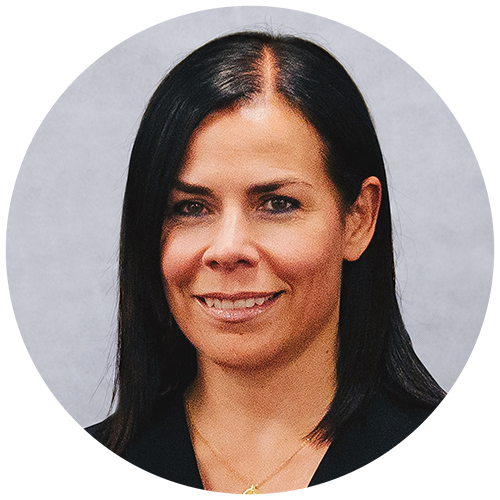
Zoë Morris, Frank Recruitment Group
Zoë Morris is the President of Frank Recruitment Group and oversees our business and sales operations, staff training, and hiring initiatives. She’s been instrumental in building the company into the global powerhouse it is today, with more than 2,700 employees and 20+ offices worldwide.
Guests

Leisa Docherty, Causeway Technologies
Leisa Docherty, Chief People Officer at Causeway Technologies, is an advocate for business-focused people strategies and creating a more diverse tech workforce. She’s held numerous C-suite HR roles over her 25-year career, supporting businesses of all sizes—from SMEs to FTSE 100 companies.
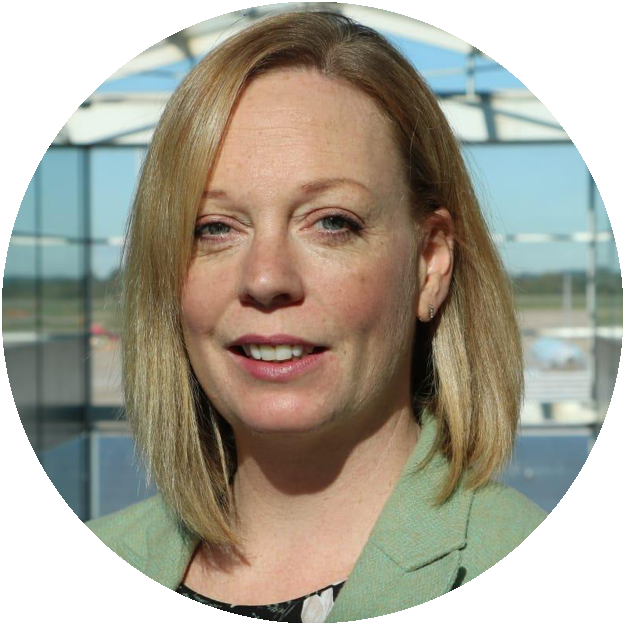
Fiona Harvey, Tisski
Fiona Harvey is Head of Marketing and Communications at cloud solutions provider and Microsoft Gold Partner, Tisski. Fiona has vast experience in both the private and public sector, and she’s hugely passionate about teamwork and getting the best out of others.
About Tech’s Leading Women
Tech’s Leading Women is a vodcast series inspired by a recent whitepaper published by Frank Recruitment Group, spotlighting some of the key issues facing women in the tech industry today.
In each episode, we explore a different topic in more depth, with unique insights and opinions from inspirational thought leaders across the tech world.
